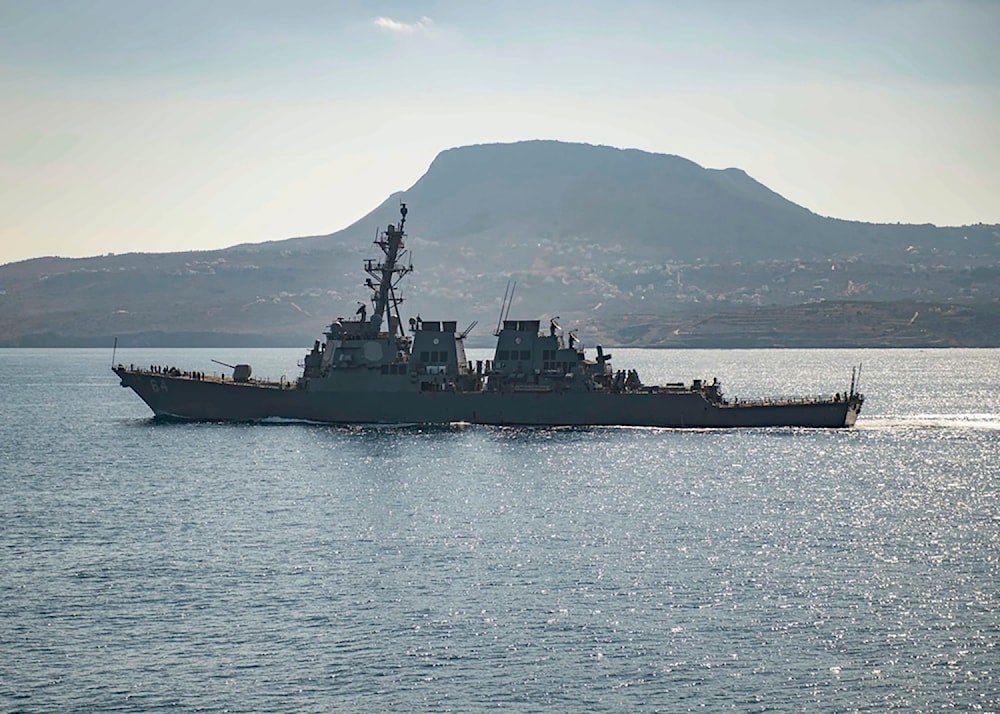CNBC: Ocean freight rates skyrocket amid Red Sea developments
A CNBC report cited experts explaining that the tensions in the Red Sea threatened the global supply chain system which has already been suffering from the ramifications of Covid-19.
-

An American warship and multiple commercial ships came under attack on Sunday, December 3, 2023 in the Red Sea. (AP)
Global logistics companies have been carrying the costs of sea and air freight shipments, as well as lost cargo stranded on ships as they divert their route from the Red Sea amid threats from the Yemeni Armed Forces (YAF).
A CNBC report cited experts explaining that the tensions in the Red Sea threatened the global supply chain system which has already been suffering from the ramifications of Covid-19.
Reports revealed that 40-foot sea freight cargo shipments from Shanghai to the US have quadrupled in price, rising from $2,400 to $10,000 in just a week. 20-foot container prices have levelled at $1,900 last week. Truck shipments to the Middle East, on the other hand, have doubled in price.
“During Covid, we had a slower build-up in freight prices due to the impact the pandemic had on the global supply chain,” OL USA CEO Alan Baer told the outlet. He added “What we are experiencing here is a light switch event where vessels are being redirected in real time. But, that said, in certain trade lanes you are seeing freight rates going up between 100% to 300%. This does not appear to be totally driven by changes in supply and demand.”
As of Thursday morning, 158 ships transporting more than 2.1 million cargo containers have diverted from the Red Sea, according to the report. The estimated value of this cargo, based on MDS Transmodal's calculation of $50,000 per container, is said to be $105 billion.
“What we are experiencing here is a light switch event where vessels are being redirected in real-time. But, that said, in certain trade lanes you are seeing freight rates going up between 100% to 300%,” Baer added, noting, “This does not appear to be totally driven by changes in supply and demand.”
Read more: Shipping firms increasingly avoiding Red Sea despite US coalition
MSC records 40% spike in cargo prices
A previous CNBC report claimed that the world’s largest ocean carrier, MSC, was the first to witness 30-40% spikes in prices of cargo from India, sparking controversy.
“To many, the jump in rates from India to the USEC [US East Coast] from approximately $2,000 per 40-foot container to $7,000 per 40-foot container in just 30 days appears egregious,” Baer said. “Is this rate increase really the level required to recover costs, or are they simply taking advantage of an unfortunate situation for the entire global community?”
International corporations have raised concerns about potential effects on product availability due to trade diversions. IKEA, a major Swedish furniture company, informed CNBC that, despite not possessing container vessels, it is collaborating with transportation partners to oversee shipments.
In response to travel suspensions prompted by incidents of ships being targeted on Monday, global shipping companies have initiated vessel diversions and are now compelled to take a longer route around the southern tip of Africa, bypassing the Red Sea and the Suez Canal.
Yemen's Armed Forces declared their intention to target all vessels headed to "Israel" in light of the ongoing genocide in Gaza.
Read more: Yemeni forces target 2 'Israel'-bound ships with naval drones: Sanaa
The YAF is closely monitoring "Israel's" movements
Earlier, the Minister of Defense in the Sanaa government, Mohammad al-Atifi, confirmed that “our forces have several options towards the Zionist enemy if it does not stop its aggression and siege on Gaza and Palestine.”
During his inspection visit to the Fifth Military Region, where he met with the commanders of axes, brigades, and military units, al-Atefi emphasized, "Our eyes are closely monitoring and tracking the entity's movements worldwide."
He further asserted, "The Zionist enemy is targeting children, women, and the wounded, with the backing of the forces of global arrogance, spearheaded by Washington, London, Paris, and all the forces of evil."
The Yemeni minister emphasized that "Yemen has now emerged as the most challenging and influential factor in any geopolitical equation," highlighting further that "the Yemeni armed forces have established a new paradigm on both regional and global scales."
He added, "The presence and activities of foreign forces and their proxies in the region place upon us, as the Yemeni armed forces, a series of sacred national responsibilities and missions, with vigilance and caution being among the foremost priorities."
Read more: Ships captured in Yemen to only leave on Palestine's terms: Exclusive

 5 Min Read
5 Min Read








